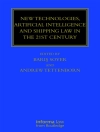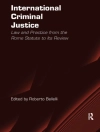This book systematically discusses the contents of the administrative right to know, the right to information, the right to gene, euthanasia and other emerging rights. The purpose of this book is to attract legal scholars to pay attention to these right changes in the process of China’s social transformation, analyze the basic laws of right changes under the specific background of China’s society and provide a theoretical system model for the establishment of China’s legislative right recognition and right relief system. The typical feature of contemporary China is all-round social transformation. In such a transitional period, the construction of democracy, legal system and political system in China is gradually unfolding and developing with its unique mode. In the construction of legal system and the practical operation of legal system, the concept of rights, the thinking of rights and the logic of rights have in fact been running through the social and legal practice in China fordecades since the reform and opening up and have always become its background, keynote and background. Its typical realistic symptom is that a large number of rights belong to 'new’ for 'China’ the germination and birth of the type. In this context, this book tries to combine the general theory with the specific reality of the right landscape and preliminarily explores and explains the generation mechanism, existence basis, development logic and basic connotation of the 'new’ types of rights, that is, the main ’emerging’ or 'new’ types of rights in the transitional Chinese society. The purpose of this book is to draw the attention of the colleagues in the field of law to the reality of the emergence and development of ’emerging’ rights in our society. At the same time, taking this as an example, I hope that the colleagues in the field of law can deepen the study of rights, especially from the general and macro-study of rights to the more specific and micro-study of rights.
Spis treści
Introduction to the emerging rights.- Generation of emerging rights: taking the right to outdoor advertising as an example.- Administrative right to know.- Right to information.- Genetic rights.- Sexual rights
O autorze
Professor Yao Jianzong is the professor of Jurisprudence, Doctor of Law, a Ph.D. supervisor, at Hainan University. At the time this book was formulated, he was serving as a law professor at Jilin University. He has been enrolled as the national level laureate of the “Hundred, Thousand, Tens of Thousands, Talents Project” and the “Ten Outstanding Young Jurists”. He is the executive director of the Chinese Law Society and the vice president (VP) of the Jurisprudence Research Society of the Chinese Law Society. During his academic life, Professor Yao has chaired dozens of national academic projects, published 20 plus academic books and 60 plus academic journal papers on jurisprudence and basic legal theories. This book is one of his masterpieces that reflects his life-time research on emerging rights and new legal fields both in theory and in practice.
Kai Liu is a Professor of Law at Jiangsu Normal University, China. He obtained a Doctorate of Law from the Faculty of Law at Utrecht University in the Netherlands, with financial support from the China Scholarship Council. Prof. Kai Liu has published over 20 papers in both Chinese and English in various international and domestic journals. Notably, Springer, a leading international publishing house, has published one of his academic monographs, for which he is the sole author. Furthermore, he has an article about teaching experience featured in the esteemed international journal 'SCIENCE.’ In terms of research contributions, he has spearheaded a national social science fund project and has been involved in a major sub-project of national social science. Beyond these, he has also overseen several other scientific research, teaching, and longitudinal research projects. He has been recognized with two provincial talent accolades: the 'Jiangsu Province High-level Innovation and Entrepreneurship Talent Introduction Plan’ and the 'Jiangsu Province 333 Project Third-level Training Object.’












